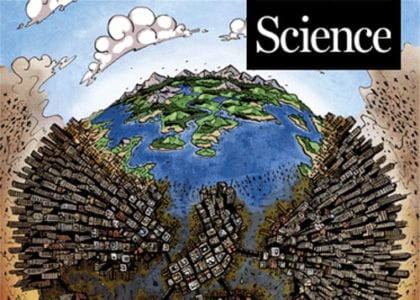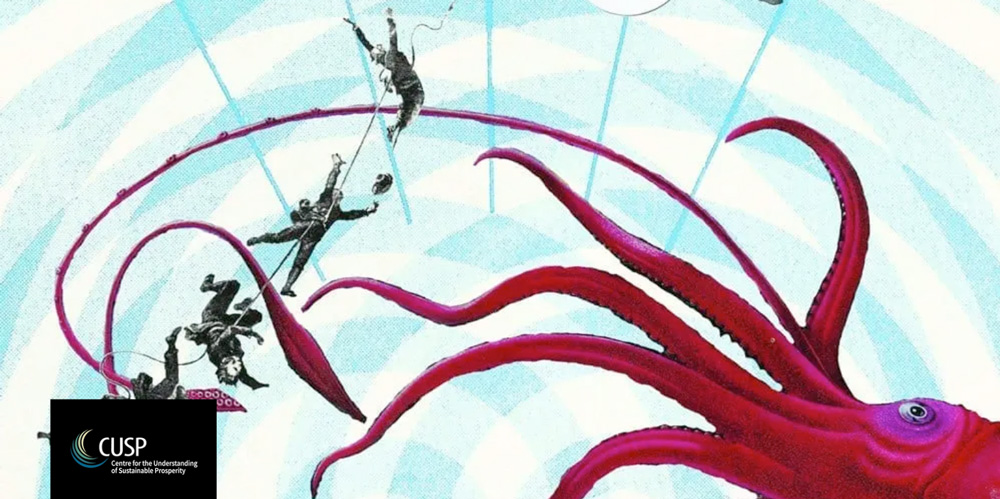How to think about the meta-crisis without getting too excited
“We are still somehow running on autopilot with the wrong kind of fuel, drunk on ideas of progress, our own significance, and the notion things will somehow be ok.” CUSP fellow Jonathan Rowson on emergency, crisis, meta-crisis, metacrisis, meta crisis—and pickles. (This short essay is extracted from a longer paper that will be published later in 2020.)

It has become fashionable to declare a climate emergency so here goes: Emergency!
Nothing happened, which is sad, but hardly surprising. If a recent paper in Nature indicating that the probability of tipping points is higher than we thought doesn’t move us, the sight of Australia on fire probably should. Whatever our metric, risk appetite, or questionable deadline of choice, the climate conclusion is always the same: we have no time to lose.
Yet the very idea of emergency only gets us so far, so fast. Emissions continue to rise because we cannot disentangle climate collapse from the broader crisis of civilisation, including the fact that there’s no ‘we’ as such, and many of our problems are already baked in through hysteresis — things in motion that cannot easily be undone.
In almost every part of the world, our scope for action on the emergency is constrained by our forms of governance, our political economy, our imperious technology, our institutional logics and our social norms. For instance, a recent paper in the journal Science makes a forensic case for why the preeminent and apparently radical policy response to climate change that is congruent with conventional policy, ‘green growth’, is highly unlikely to save us. Our climate emergency calls for action but our crisis calls for the kinds of insightful resolve that make qualitatively different kinds of action possible, sometimes called transformation or systems change.
If only it were that easy. All of our rallying cries arise in cultures and psyches riddled with immunities to change. It behooves us to better understand who and what we are, individually and collectively, in order to be able to fundamentally alter how we act. That conundrum is the meta-crisis lying within, between and beyond the emergency and the crisis, and it’s educational, epistemic and spiritual in nature.
To clarify: the emergency is about the urgency to act. The crisis is about the unreasonable necessity of transformation. The meta-crisis is about the tenacity of our inertia. Once you take the meta-crisis seriously and start looking at it closely however, it seems deep, wide and plural (the meta-crisis, the metacrisis and the meta crisis are subtly different for a start). Trying to define the meta-crisis too briskly is foolish because it’s alive; it lives within us, between us and beyond us, and to some extent defines us — it is as much a part of our nervous system as a part of our social imaginary.
Bonnitta Roy’s multiple meanings of meta all involve oblique or abstract moves that are felt to be necessary or helpful, and meta need not be exotic. Learning how to learn is meta and schools go there all the time. Parents of young children are often tired of being tired; I’ve had meta-fatigue for a decade. And the best Ted talk, in my view, was the one about how bad Ted talks are. More simply, if you ‘go meta’ on oranges and apples, you get that infamous piece of jargon known as fruit. Popular comedies like Seinfeld ran on meta-themes, as did House of Cards when ‘the fourth wall’ was breached. Meta is waiting to be noticed and appreciated. We are already meta.
The term meta-crisis however, is a little too clever for its own good; it’s emotional resonance is limited to those who get excited by abstraction. Most people are not moved even by the distinction between emergency (calling for urgent action) and crisis (calling for a change in the way things change) so the idea of meta-crisis risks sounding, at best, oxymoronic. If it’s really a crisis, surely it can’t be (checks notes) meta? As Zak Stein argues, there are also limits to the wisdom of going meta, which can easily become a pseudo-intelligent love of infinite regress disconnected from the pragmatic purposes of thought.
Two things seem right to me: the idea of meta-crisis is indispensable, but there’s a strong case for holding it lightly as a term, and keeping it in a properly playful perspective. Which means we need to understand it well enough to let it go.
**
Just over a year ago our neighbour Pat came around with an unusual pumpkin pie. I don’t particularly like pumpkin, but the pie hit my philosophical sweet spot. Look closely and you find two things that are really the same thing. The pumpkin on the inside and the pumpkin on the outside are reciprocally defined by each other; they are both one thing and another thing that’s neither of them. It’s a meta pumpkin pie, and it was delicious.
See Exhibit A below.

In The Politics of Virtue, Milbank and Pabst describe a wide range of meta-crises, mostly characterised by a kind of self-referential excess, for instance the meta-crisis of capitalism arises from capital being too free, leading to its abstraction and reification, as money becomes increasingly untethered to the actual material world. In his review of their book, Rowan Williams frames it as follows:
There are crises and there are meta-crises: a system may stagger from one crisis to another but never recognise the underlying mechanisms that subvert its own logic…If we are now panicking about the triumph of a politics of resentment, fear and unchallengeable untruthfulness, we had better investigate what models of human identity we have been working with. Our prevailing notions of what counts as knowledge, our glib reduction of democracy to market terms, our inability to tackle the question of the limits of growth — all these and more have brought us to the polarised, tribal politics of today and the thinning out of skill, tradition and the sense of rootedness. Treating these issues with intellectual honesty is not a sign of political regression but the exact opposite.
This ‘underlying mechanism that subverts its own logic’ is the basis for Patrick Deneen’s paradoxical contention that liberalism has failed because it has succeeded. For instance, through its emphasis on the protection of the individual by the state (mostly through human rights law) liberalism weakened the power of intermediate institutions and became simultaneously more individualist and statist; and by supporting the apparently free market, it has facilitated the coercive power of commerce in ways that make us less free. As Deneen puts it in Why Liberalism Failed: “Liberalism created the conditions, and the tools for the ascent of its own worst nightmare, yet it lacks the self-knowledge to understand its own culpability.”
More generally, the meta-crisis refers to our inability to see how we see, our apparent lack of interest in understanding how we understand; our failure to perceive how we perceive or to know how we know. In this sense, the hyphenated term ‘meta-crisis’ is valuable because that conjunction of words highlights that our relationship to the crisis is part of the crisis.
**
Exhibit B is Willy Wonka’s defective bubble gum, which loosely represents ‘the metacrisis’.
In Charlie and The Chocolate Factory, the owner Willy Wonka has created a small piece of gum that’s supposed to offer the experience of a three-course meal, but when a character called Violet tastes it, she turns violet during the desert phase, expanding to become a large blueberry before being rolled away for ‘juicing’ to prevent her from exploding. The defective bubble gum represents the idea that small things contain bigger things that are not quite right. I am trying to get at the holographic notion that each part (eg individual, home, country) somehow contains the whole (eg political economy, society, planetary limits) and we often fail to discern that the problems of the parts come from the whole (and vice-versa). A better example might be salty sea water, signifying that there are drops in every ocean, and an ocean in every drop, but that’s not as much fun.
In any case, the metacrisis is the underlying crisis driving a multitude of crises, not just ecological collapse (which is certainly bad enough) but a range of governance and security issues, alongside global economic instability and inequality within countries, a steep rise in mental health problems and a decline in social trust. It’s as if we have a civilisation-level wicked problem. In his first article on The Emergentsia, Brent Cooper writes: “The term refers to the set of root problems behind all major crises. The idea goes back at least to the 1970 Club of Rome report which describes 49 “continuous critical problems” which they also call “meta-problems.” Moreover, in a talk at Google, “Confronting the “Meta-Crisis”: Criteria for Turning the Titanic”, philosopher entrepreneur Terry Patten reflects on the need to speak to meta-crisis as “the sum of our ecological, economic, social, cultural, and political emergencies.”
**
Exhibit C is The Joker’s Omelette.
“You can’t make an omelette without breaking some eggs” is a familiar line, but I first heard it from the Joker in a scene from the 1989 film version of Batman. At a figurative level, we don’t always recognise that there are broken eggs in the omelette; we don’t always think — what’s inside this? Where did this come from? What’s ‘the thing behind the thing?’ On this framing, ‘the meta crisis’ arises from large swathes of the population being unable or unwilling to make such meta moves or consider them worthwhile.
Human development involves creating an observational gap between what we are defined by and what we seek to relate to. That happened when we first saw Earth from space; it also happens when we stop saying ‘left-wing’ and ‘right-wing’ an start asking: is this political spectrum really helping us, and should we perhaps create a new one? A recent example is the debate over Brexit in the UK when numerous positions were described as being more or less democratic, but almost never was the broader question of what democracy might mean discussed.
**
That brisk tour of ‘The MC’ reveals a basic threefold pattern:
The hyphen in ‘meta-crisis’ speaks of a crisis of self-reference and sometimes a paradoxical failure of achievement; too much liberty may kill liberalism, too much voting can weaken democracies, and we don’t always understand how we understand, we tend to deny our denial, and we are struggling to imagine a new imaginary.
The composite word ‘metacrisis’ is inspired by our German friends, and useful for resolving to speak to the cross-pollinating crises of our time as one thing; the aim is to better ‘join the dots’ between apparently disparate phenomena while recognising that no single grand vision or narrative, however textured and inclusive, can fully make sense of itself.
The adjective in ‘meta crisis’ says that’s the kind of crisis it is — a crisis defined by a debilitating lack of epistemic agility –too much abstraction in some ways and too little in others; a cultural inability or unwillingness to ‘go meta’, for instance to think about the political spectrum rather than merely thinking with it, or for economic commentators to question the very idea of ‘the economy’ or what exactly we mean by ‘money’.
There is no getting away from ‘The MC’, a coinage to capture all the meanings at hand. If knowledge of The MC teaches us anything it’s that it works better as an analytical tool than a call for action(to address the emergency) or transformation(to address the crisis). Social change efforts need much more powerful and even psychoactive language to help us stay awake to the challenges of our time. We cannot side-step meta issues, but the challenge is not to shout about them; rather the challenge is to reveal that meta is normal, even mundane, if only so that we can stop talking about it.
While most developmental progress is about ‘the subject-object move’ in which we abstract from something so as to relate to it better, in the case of meta-themes in planetary problems we seem to need an ‘object-subject move’ as well, such that the disposition to abstract becomes immanent, familiar, and assimilated as second nature. The aim is to know the meta-crisis well enough that it ceases to be ‘meta’ and ceases to be a ‘crisis’, thereby freeing us to get back to living meaningfully and purposively, without getting entangled in strange loops.
Or as the poet David Whyte puts it:
Innocence is, in a way, the ability to be found by the world. It’s not a state of naïveté. It’s the ability to be found by the world you’re now inhabiting. Part of what we find is, we’re just supposed to give ourselves away.
**
As we reckon with the gravity of the emergency, the intractability of the crisis and the depth and breadth of our meta-crisis, and then come back to ourselves, I believe all way we can say, with sincere irony, is that we’re in a bit of a pickle.
The word ‘pickle’ comes from the Dutch word ‘pekel’. Since the seventeenth century, vegetables of various kinds, not least gherkins, have been preserved in a brine-like substance that took the name. The expression ‘in a pickle’ alludes to difficulty in the sense of being as trapped, mixed up and disoriented as the pickled vegetables in a jar. The etymological fidelity of that claim matters less than whether it helps us sense how we are mixed up with others things, somehow stuck, and struggling to change.
There are also early uses of ‘in a pickle’ by Shakespeare, relating to being drunk, and sometimes being drunk while not knowing we’re drunk; and that’s also appropriate for our current predicament. We are still somehow running on autopilot with the wrong kind of fuel, drunk on ideas of progress, our own significance, and the notion things will somehow be ok.
The pickle is not another name for the meta-crisis but a way of recognising its plurality without getting lost in it, and keeping it connected to the beating heart of the emergency and the materiality of the crisis.
Experiencing the pickle is playing with abstraction enough to know our predicament as fully as possible, but then gladly returning back into everyday existence, crucially in a way that is no longer naïve about the provenance of our situation. It’s the simplicity on the other side of complexity we need, sometimes known as simplexity.
In practice that ‘subject to object to subject move’ will manifest in praxis of various kinds and could mean anything from activism, business or politics to contemplation to better parenting and even just friendship — it’s about living an embodied everyday existence, with civilisation as a whole in mind.
We cannot (and must not!) ‘go meta’ on the pickle, but we may need to taste the pickle more often to save civilization from itself.
Emergency says: Act!
Crisis says: Transform!
Meta-crisis says: How?
The Pickle holds three old friends in its arms, squeezes them tight, and says:
Well, what does it say?



